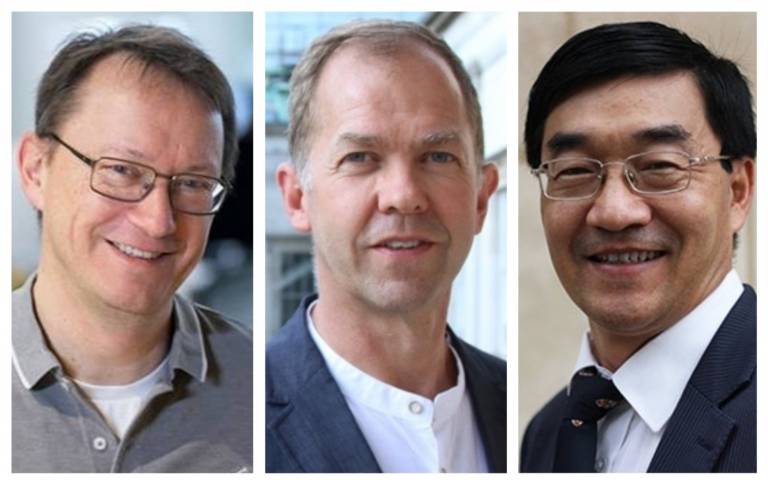UCL academics elected to the Royal Academy of Engineering
25 September 2020
Professors Peter Lee and Kai Luo (both UCL Mechanical Engineering) and Professor Mark Harman (UCL Computer Science) have been made Fellows of the Royal Academy of Engineering in recognition of their outstanding contributions to the field.

The three academics are among 53 eminent engineers formally admitted to the academy this year. The Fellowship represents the nation’s best engineering researchers, innovators, entrepreneurs, business, and industry leaders.
Professor Peter Lee, who holds a Royal Academy of Engineering Chair in Emerging Technologies (Additive Manufacturing), is a materials scientists who leads UCL’s Materials, Structures and Manufacturing lab group at Harwell, home to Diamond Light Source, the UK’s national synchrotron science facility.
His work in solidification and X-ray imaging has enabled us to see inside materials in 3D as they change in time, revealing how microstructures evolve in alloys, bioactive-glasses and geological systems. This has helped a range of industries - from aerospace to biomedicine to energy – solve important engineering challenges, for instance in developing additive manufactured human joint replacements or lightweight automotive components.
Professor Lee said: “Becoming a Fellow of the Royal Academy of Engineering is a real honour, but is more a reflection of the outstanding scientists, engineers and medics I’ve worked with both within my group, and as colleagues and collaborators both at UCL, within the UK and worldwide.”
Professor Kai Luo, Chair of Energy Systems at UCL, has made outstanding contributions to engineering research, education and practices over three decades. He has been responsible for the development of cutting-edge models and numerical methods, from nanoscale to macroscale, that have transformed energy system diagnostics, design and optimisation.
He has unique expertise in mesoscale modelling and simulation that bridges the science and engineering boundary, making ground-breaking advances in both spheres.
Professor Mark Harman (UCL Computer Science), Professor of Software Engineering at UCL and a Research Scientist at Facebook, founded the field of search-based software engineering and shaped its direction over two decades. Most recently his work formed the foundation of Facebook's automated test design system Sapienz, directly impacting over two billion people around the world.
Professor Harman said: “Looking at the people who have also been made Fellows, I’m pleased and humbled to be in their company.” He said the Fellowship would enable him to meet engineers from many other disciplines, feeding his understanding of the world’s challenges. The key to his achievements, he said in an interview with Facebook, was being surrounded by a “great team of people who share and understand the vision”.
Sir Jim McDonald, President of the Royal Academy of Engineering, said: “The new Fellows who join us today are among the most talented and successful engineers working in the field, leaders in areas from transport and our essential data infrastructure to lifesaving developments in medical research.
“We look forward to working with them and benefiting from their ideas and insight as we strive to inform public debate and provide workable solutions to our shared national and global challenges.”
The Fellows of the Royal Academy of Engineering comprise nearly 1,600 eminent engineers from both industry and academia in the UK and around the world.
Links
- Professor Peter Lee’s academic profile
- Professor Kai Luo’s academic profile
- UCL Mechanical Engineering
- Professor Mark Harman’s academic profile
- UCL Engineering
- Royal Academy of Engineering
- Royal Academy of Engineering Fellows of 2020
Image
- From left: Professor Mark Harman, Professor Peter Lee and Professor Kai Luo.
Media contact
Mark Greaves
Tel: +44 (0)7539 410 389
Email: m.greaves [at] ucl.ac.uk
 Close
Close

